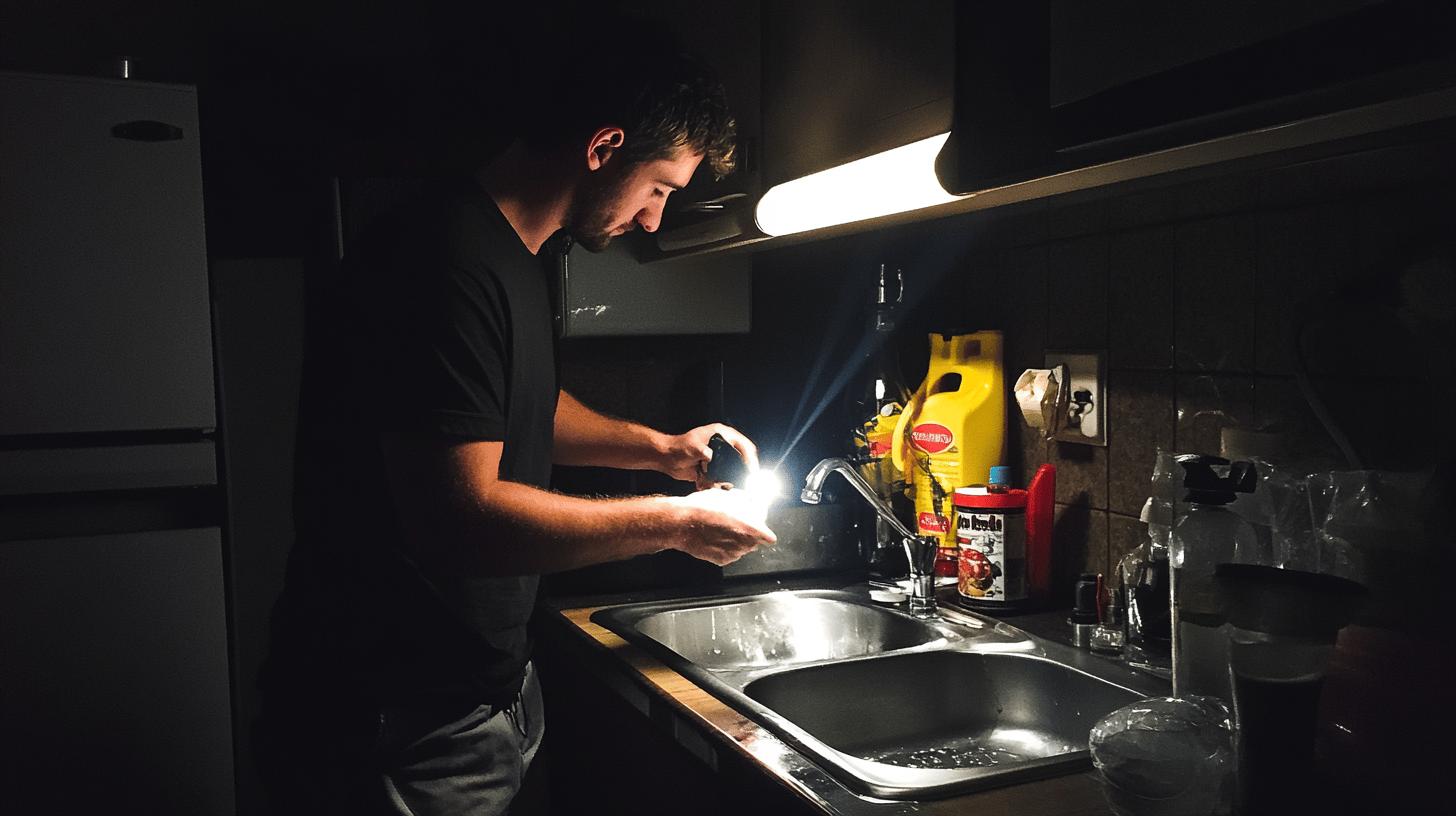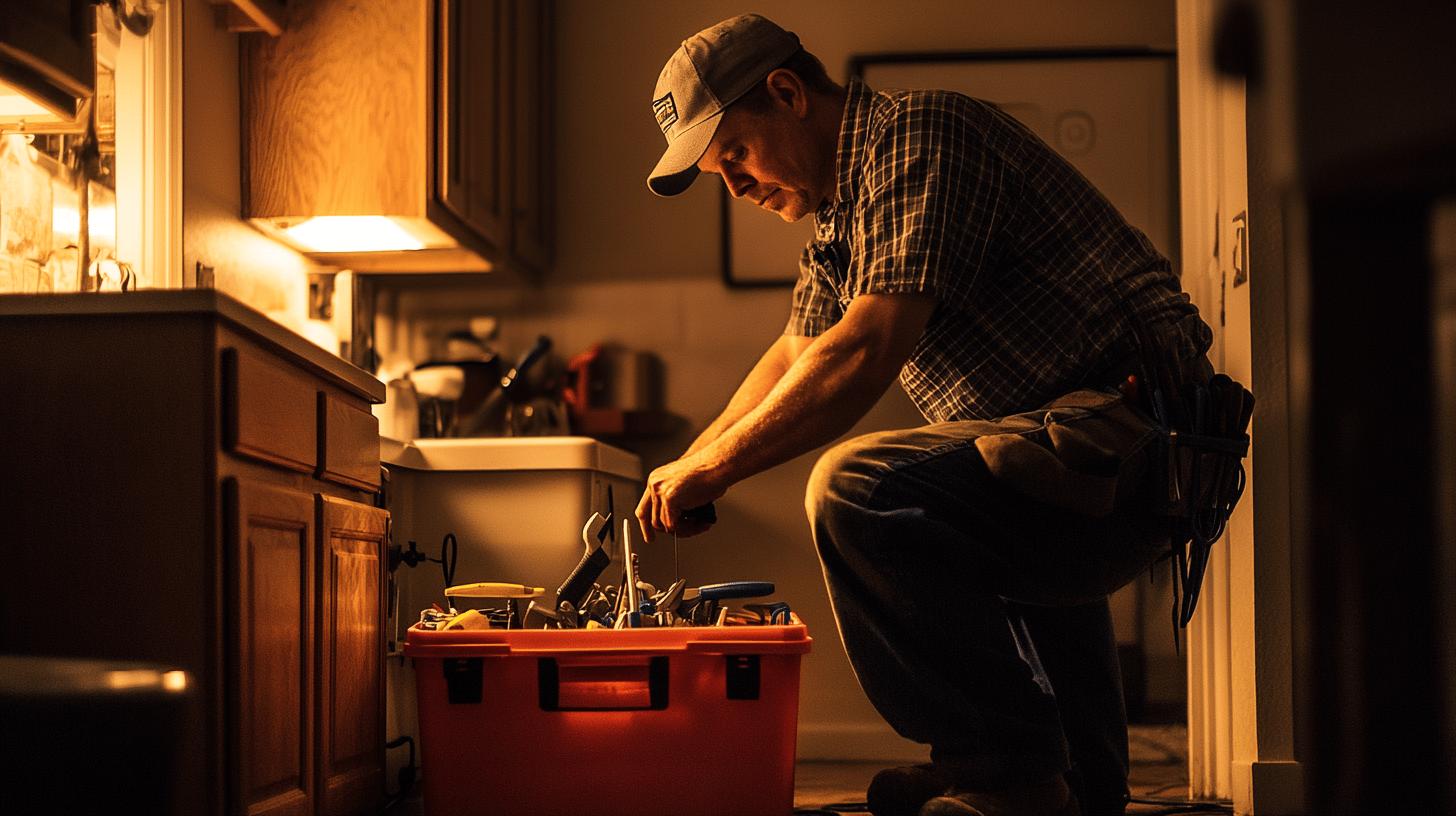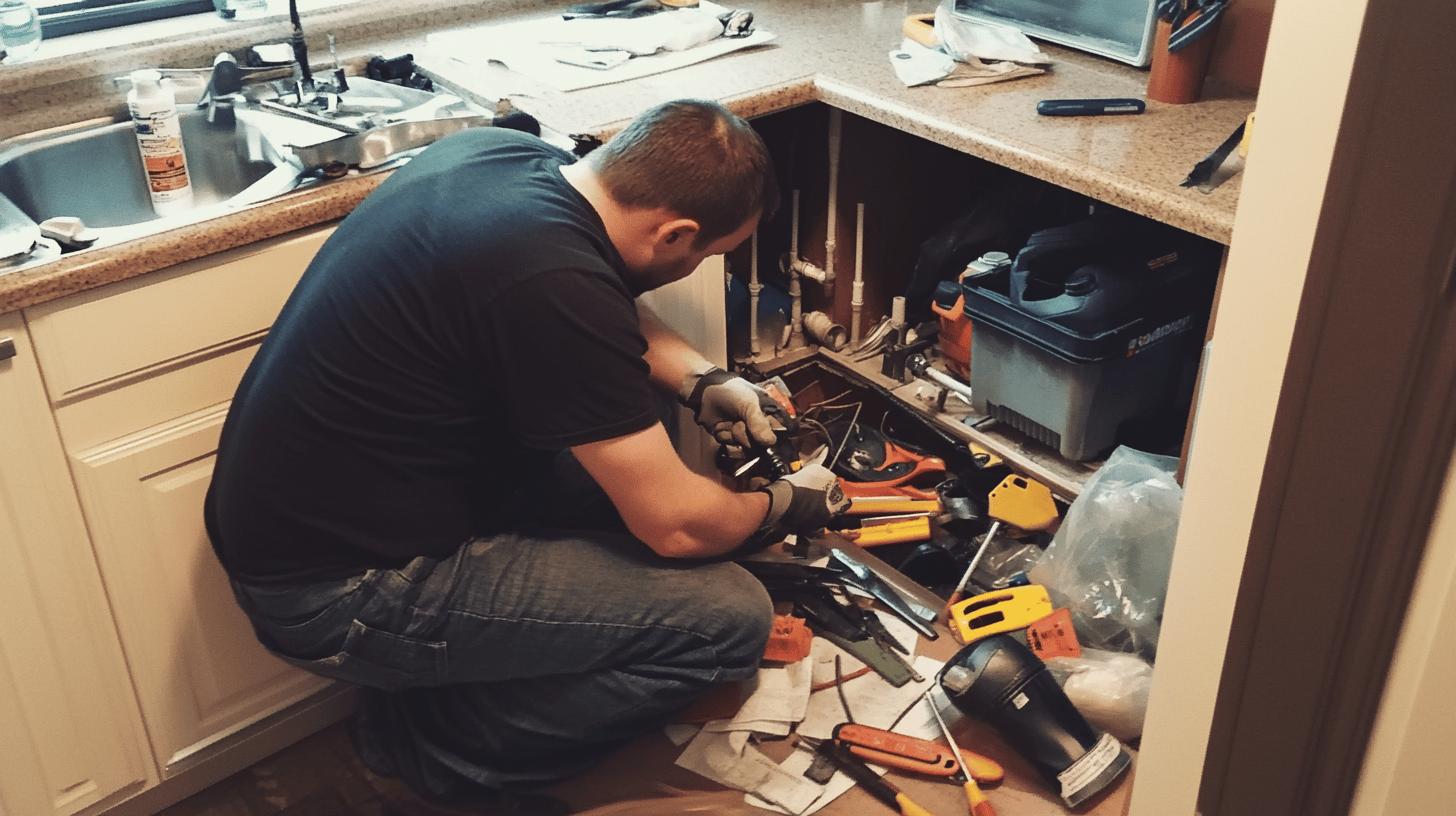TL;DR:
Common Plumbing Emergencies:
- Clogged sinks, toilets, bathtubs, and shower drains
- Leaky faucets, toilets, water heaters, and washing machine hoses
- Broken water lines and burst pipes
- No hot water
Immediate Actions:
- Turn off main water supply for burst pipes; call a plumber
- Use a plunger for clogs; avoid chemical cleaners
- Turn off water and power for leaky water heaters; call for service
- Evacuate and contact gas company for gas leaks
Emergency Service Costs:
- Burst Pipes: $150 – $500
- Clogged Drains: $100 – $300
- Leaking Water Heaters: $150 – $400
- Gas Leaks: $200 – $500
Preventive Tips:
- Regular inspections, pipe insulation, and avoiding non-degradables.
Do you know what to do if a pipe bursts at 2 a.m. or if your water heater suddenly stops working? Plumbing emergencies always seem to happen at the worst times, but knowing how to handle them can save you from serious damage and expensive repairs. In this article, we’ll cover the most common plumbing emergencies and give you practical solutions you can use right away. Whether it’s a clogged toilet or a leaking water heater, being prepared makes a big difference. Let’s check out these quick fixes so you’re ready for any plumbing crisis!
Understanding Common Plumbing Emergencies
Spotting common plumbing emergencies early can stop small problems from becoming major headaches. Knowing what to watch for and taking quick action can really help keep your home’s plumbing in good shape. Let’s check out some of the most frequent plumbing issues and why they happen.
One of the most common problems is a clogged toilet. This usually happens when too much toilet paper or other stuff blocks the drain. A clogged toilet can cause the bowl to fill up, leading to overflow and water damage.
Burst pipes are another serious problem, often caused by old age or freezing temperatures. When a pipe bursts, it releases a lot of water, which can damage your home and belongings.
Having no hot water is a big hassle, especially in winter. It affects everyday things like showers, washing dishes, and doing laundry, so it’s important to fix it quickly.
Leaky faucets, toilets, water heaters, and broken water lines are also common issues. A leaky faucet or toilet might seem small, but it can waste a lot of water and raise your utility bills. Leaking water heaters waste water and can lead to flooding. Broken water lines can mess up your entire water supply, so you need to fix them right away to avoid serious damage.
Common plumbing emergencies include:
- Clogged sinks
- Clogged toilets
- Clogged bathtubs and shower drains
- Leaky faucets and toilets
- Leaking water heaters
- Leaky washing machine hoses
- Broken water lines
- Burst pipes
- No hot water
Immediate Steps to Take During a Plumbing Emergency

If you have a burst pipe, it can lead to serious water damage really fast. First, turn off the main water supply to stop more water from flowing. This is super important to prevent flooding and further damage to your property. After that, call a 24/7 emergency plumber for help. They’ll fix the problem quickly and correctly.
For a clogged drain or toilet, start by using a plunger. It often does a great job clearing small blockages. If that doesn’t work, skip the chemical drain cleaners because they can harm your pipes. Instead, call a professional plumber to take care of it safely.
If your water heater is leaking, turn off the water supply to it right away. You should also switch off the power to avoid any electrical issues. Leaking water heaters can cause a lot of damage and safety risks, so get an emergency plumber to inspect and repair it as soon as you can.
If you smell gas, act fast! Get everyone out of the building to stay safe. Then, call your gas company and emergency services from a safe spot. Don’t use any electrical devices or flames, as these could ignite the gas and cause an explosion.
Immediate steps to take during a plumbing emergency:
- Burst Pipes:
- Turn off the main water supply.
- Contact a 24/7 emergency plumber.
- Clogged Drains or Toilets:
- Use a plunger to clear the blockage.
- Avoid chemical drain cleaners.
- Call a professional plumber if the blockage persists.
- Leaking Water Heater:
- Turn off the water supply to the heater.
- Switch off the power to the heater.
- Schedule an emergency plumbing service.
- Gas Leak:
- Evacuate the premises.
- Contact your gas company and emergency services.
- Avoid using electrical devices or open flames.
The Cost of Plumbing Emergency Services
Emergency plumbing services can really hit your wallet because they’re needed right away. Usually, hiring an emergency plumber costs between $100 and $500. This price can change based on how serious the problem is and when it happens. For instance, fixing a minor clogged drain might cost less, while a burst pipe could be at the higher end because it’s more complicated and can cause a lot of damage.
Also, keep in mind that 24-hour emergency plumbing services often charge extra for after-hours work, adding another $50 to $150 to your bill.
Several factors can affect these costs. The type of emergency is a big one; serious issues like gas leaks or burst pipes need immediate attention and more work, which drives up the price. The materials needed for repairs also play a role, especially if special parts are required. Plus, the complexity of the repair can increase labor costs since tougher problems take more time and skill to fix.
| Service Type | Average Cost |
|---|---|
| Burst Pipes | $150 – $500 |
| Clogged Drains | $100 – $300 |
| Leaking Water Heaters | $150 – $400 |
| Gas Leaks | $200 – $500 |
Finding a 24-Hour Emergency Plumber Near You

Having a 24-hour emergency plumber on speed dial can really cut down on stress and damage during a plumbing emergency. Problems like burst pipes or major leaks can happen anytime, often at the worst moments. A trustworthy emergency plumber means help is just a call away, no matter the time. This helps limit damage and gets your plumbing back on track fast.
To find a reliable 24-hour emergency plumber, start by searching online. Look for local plumbers who offer 24/7 services; they’re more likely to be available when you need them. Check their websites for info on their services, response times, and any extra fees for after-hours work. Also, read customer reviews to get a sense of how reliable and effective they are.
Another good way to find a plumber is by asking friends, family, or neighbors who’ve used emergency plumbing services before. Personal recommendations can give you great insight into a plumber’s professionalism and how well they handle emergencies.
When selecting a 24-hour emergency plumber, consider these tips:
- Check for Licensing and Insurance: Ensure the plumber is licensed and insured to protect yourself from liability.
- Upfront Pricing: Look for plumbers who offer upfront flat-rate pricing to avoid unexpected costs.
- No Overtime Charges: Prefer plumbers who do not charge extra for after-hours services.
- Local Operation: Choose a locally owned and operated plumber for quicker response times.
- Customer Reviews: Read reviews to confirm the plumber’s reliability and quality of service.
Preventive Tips to Avoid Plumbing Emergencies
Preventive maintenance is key to avoiding plumbing emergencies that can cause expensive repairs and a lot of stress. By regularly checking your plumbing system, you can catch potential problems before they turn serious. This proactive approach not only helps your plumbing fixtures last longer but also keeps your home’s water systems running smoothly.
Here are some essential preventive tips to help you avoid plumbing emergencies:
- Inspect Plumbing Fixtures Regularly: Look for signs of wear and tear, such as leaks or rust, and address them promptly.
- Insulate Pipes: During cold weather, insulate pipes to prevent them from freezing and bursting.
- Avoid Flushing Non-degradable Items: Only flush toilet paper down the toilet to avoid blockages.
- Check Water Pressure: Ensure your water pressure is not too high, as this can damage pipes and fixtures.
- Clean Drains Regularly: Use non-chemical methods to keep drains clear of debris and buildup.
- Maintain Water Heater: Regularly inspect your water heater for leaks and sediment buildup.
- Know Your Main Water Shut-Off Valve: In case of an emergency, knowing how to quickly shut off your main water supply can minimize damage.
Following these preventive tips can help you save money and cut down on stress by lowering the chances of surprise plumbing emergencies. Regular maintenance lets you spot problems early, making repairs easier and cheaper. Plus, it keeps your plumbing system running smoothly, giving you peace of mind and a safer home.
Final Words
Knowing about common plumbing emergencies helps you respond quickly and effectively. Recognizing problems like clogged sinks and burst pipes can prevent more damage and costly repairs. Taking quick actions, like shutting off the main water supply, can lessen the impact of a plumbing crisis. While the cost of emergency plumbing services can vary, it’s important to have a general idea of what to expect financially.
Finding a dependable 24-hour emergency plumber will keep you prepared for any situation. Plus, using preventive tips can protect your home from future plumbing issues. Keep these insights in mind—they can save you money and give you peace of mind.
FAQ
What is considered a plumbing emergency?
A plumbing emergency involves situations like burst pipes, severe leaks, clogged drains, and no hot water. These issues can cause significant water damage and disruption, needing immediate attention.
Is a leaking toilet pipe an emergency?
A leaking toilet pipe is considered an emergency because it can lead to water damage, mold growth, and increased water bills. Timely repair is important to prevent further complications.
Is a clogged toilet a plumbing emergency?
A clogged toilet can be an emergency, especially if it’s the only toilet in the home. It may cause overflow and unsanitary conditions, requiring urgent plumbing assistance.
Is a water leak an emergency in an apartment?
A water leak in an apartment is an emergency. It can cause structural damage, mold growth, and affect neighboring units. Immediate action is crucial to minimize damage.
What are common plumbing emergencies?
Common plumbing emergencies include:
- Burst pipes
- Clogged toilets
- Leaking faucets
- No hot water
- Leaking water heaters
What should I do in a plumbing emergency?
In a plumbing emergency:
- Turn off the main water supply.
- Use a plunger for clogs.
- Shut off power to leaking water heaters.
- Call an emergency plumber for quick assistance.
How much does an emergency plumber cost?
Emergency plumbing services typically range from $100 to $500. After-hours services may add $50 to $150. Costs vary based on the emergency severity and repair complexity.
How can I find a 24-hour emergency plumber near me?
To find a 24-hour emergency plumber:
- Search online directories.
- Ask for referrals from friends and neighbors.
- Check for reviews and ratings.
- Look for licensed and insured providers.
- Evaluate response times and service guarantees.
Are there ways to avoid plumbing emergencies?
To avoid plumbing emergencies:
- Regularly inspect and maintain fixtures.
- Insulate pipes in cold weather.
- Avoid flushing non-degradable items.
- Fix minor issues promptly.
- Schedule annual plumbing check-ups.

